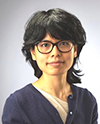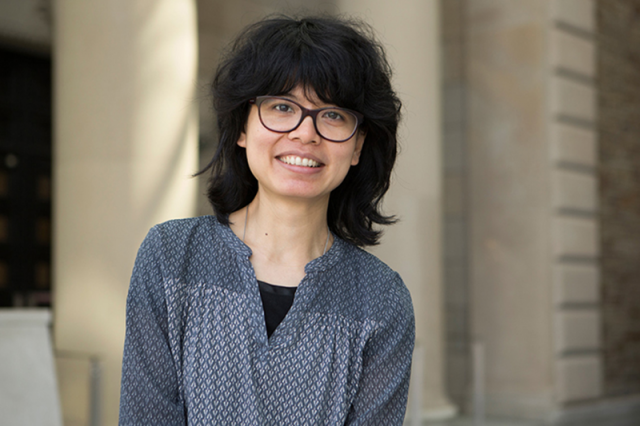Rising star in chemical biology, Yimon Aye received a training at the frontiers of small-molecule chemistry and mechanistic biology which endowed her with a unique, cross-disciplinary vision. She has been appointed Associate professor of Chemistry by the ETH board and will start at the EPFL in 2019. She will also be a member of the NCCR Chemical Biology from 2019 onwards. We are very proud to have her amongst our scholars. Meet her already today through her interview which could be encapsulated in a quote “work hard, think hard, learn hard, be a team player and have no fear”.
Why are you active in the field of chemical biology?
Scientists are here to solve challenging/pressing problems using whatever sets of skills/tools and knowledge it takes. In my experience, chemical biologists are primed to take that exact role, setting no boundaries on specific fields/expertise. We can be fearless about innovating methods and employ ideas from any discipline. I was privileged to have been trained in chemistry and biology so I am positioned to make contributions to this rapidly evolving arena and to mentor trainees at the crossroads of many scientific fields.
Describe the most intense moment of your career.
Perhaps, two points thus far: first, when I left my comfort zone (upon finishing my PhD) to learn the ropes of biology from the ground up (I had a decade-long training in organic chemistry, and I had not even taken high-school biology). Second, during my early independent years where I made the decision to explore and learn the genetics/biology of C. elegans and zebrafish, to extend my lab’s chemical biology tools to these more complex but relevant in vivo models to better address the problems and understand the Nature’s design principles.
Which is the best idea you ever had?
Ask me when I am 65 🙂
Do you have a role-model or a driving force?
I was trained by two pioneers whose legacies continue to drive forward the respective fields of organic chemistry and enzymology. Their mentorship also inspired me to try to mirror their contributions in my own field as much as possible.
The philosophy along which lines you lead your lab?
Leave one’s inhibitions behind. Think hard and strive for big-picture projects/avoid addressing incremental questions in your comfort zone. Try to be a team player.
Pick a paper you praise for the elegance of its demonstration.
There are a handful of papers falling under this both within and beyond my field (from both diceased and living scientists) that it is hard for me to single one out.
Can you shed light on the relevance of inter-disciplinarity for scientific breakthroughs?
I believe it is key. I also think that we should promote up-and-coming younger scientists to stretch their minds and not to be afraid of failure/unknowns; too many of us are too reluctant to try something outside our comfort zones. I also think all science/scientists benefit way more from crosstalking with scientists in completely unrelated fields, attending meetings that are completely outside their own field.
Define research with just three words.
Solving Important Problems.
How do you match the words beauty and science?
Science is, of course, functional, but so is nature. We do not have to look far around Switzerland to see the beauty the natural world offers. But it all stems from scientific processes that would have been long time abandoned unless they were quite rigorously effective, efficient and optimized, just like a good reaction/assay, I suppose.
A piece of advice you’d like to give to the young generation of researchers?
To be fearless about failure : try out something challenging/unconventional and never give up. To perhaps ensure that your learning curve is always on the steepest slope. I think it is extremely fun to never stop learning and trying out new things.
A book, song, poem, music or painting that you spot out and get inspiration from?
MC Escher’s impossible works, like Waterfall, are a testament to how the more you learn, the further you have to go!
 Born and raised in Burma, Yimon Aye achieved her undergraduate and PhD degrees in Chemistry and Organic Chemistry at Oxford (UK) and Harvard (USA). During her postdoc training at MIT (USA), she studied the regulatory mechanisms of the enzyme ribonucleotide reductase. In her independent career that began mid-2012, Yimon Aye set out to understand the detailed mechanisms of electrophile signaling. This impetus culminated in the development of “REX” technologies (T-REX™ delivery and G-REX™ profiling). In a parallel research program, Yimon studies pathways involved in genome maintenance and nucleotide signaling, including the mechanisms of anticancer drugs in clinical use.
Born and raised in Burma, Yimon Aye achieved her undergraduate and PhD degrees in Chemistry and Organic Chemistry at Oxford (UK) and Harvard (USA). During her postdoc training at MIT (USA), she studied the regulatory mechanisms of the enzyme ribonucleotide reductase. In her independent career that began mid-2012, Yimon Aye set out to understand the detailed mechanisms of electrophile signaling. This impetus culminated in the development of “REX” technologies (T-REX™ delivery and G-REX™ profiling). In a parallel research program, Yimon studies pathways involved in genome maintenance and nucleotide signaling, including the mechanisms of anticancer drugs in clinical use.


Leave a comment
The editors reserve the right not to publish comments or to abridge them.